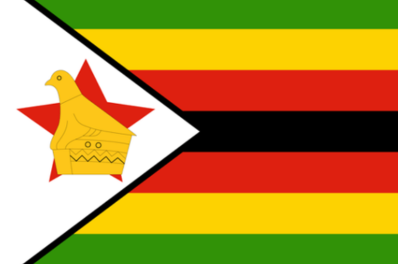World
Zimbabwe : Unity, Freedom, Work

Zimbabwe is a landlocked country in southern Africa, bordered by Zambia to the north, Mozambique to the east, South Africa to the south, and Botswana to the west. The country has a rich and complex history that stretches back to ancient times, with evidence of human occupation dating back at least 100,000 years.
Early History
The earliest known inhabitants of what is now Zimbabwe were the San people, who lived in the region for tens of thousands of years before the arrival of Bantu-speaking tribes around 200 AD. These tribes brought agriculture, ironworking, and other technological advancements to the region, and they gradually expanded their territories over the next several centuries.
The most powerful of these early states was the Kingdom of Zimbabwe, which emerged in the 11th century and lasted until the 15th century. This kingdom was known for its impressive stone architecture, including the Great Zimbabwe complex, which is now a UNESCO World Heritage Site. The Kingdom of Zimbabwe was a major center of trade, with gold, ivory, and other goods flowing into the kingdom from surrounding regions.
Colonial Era
In the 19th century, European powers began to colonize Africa, and Zimbabwe (then known as Rhodesia) was no exception. The British South Africa Company, led by Cecil Rhodes, obtained a charter to administer the region in 1889, and the company began to establish a settler colony.
The colonial period was marked by violence and oppression, as the white minority government implemented discriminatory policies that marginalized the black majority. Land was taken from black farmers and given to white settlers, and black people were forced into labor and subjected to other forms of exploitation.
Independence and Mugabe Era
In the 1960s and 1970s, a nationalist movement emerged in Zimbabwe, led by figures like Robert Mugabe and Joshua Nkomo. This movement aimed to end colonial rule and establish a democratic government that represented the interests of all Zimbabweans.
In 1980, Zimbabwe gained independence from Britain, and Mugabe became the country’s first prime minister. Mugabe’s rule was initially popular, as he implemented policies aimed at improving education, healthcare, and other social services. However, over time, Mugabe became increasingly authoritarian, and his government was accused of widespread human rights abuses, including election rigging, censorship, and violence against political opponents.
Mugabe remained in power for 37 years, until he was forced to resign in 2017 following a military coup. His successor, Emmerson Mnangagwa, promised to bring about democratic reforms and improve the economy, but his government has faced its own share of controversies, including allegations of corruption and human rights abuses.
Current Challenges and Future Prospects
Today, Zimbabwe remains one of the poorest countries in the world, with high rates of poverty, unemployment, and inequality. The country’s economy has been hit hard by hyperinflation and a lack of foreign investment, and the government has struggled to provide basic services to its citizens.
Despite these challenges, Zimbabwe has a rich cultural heritage and a diverse population that is working to build a more prosperous and equitable society. The country has made progress in areas like healthcare and education, and there are signs of growing entrepreneurial activity and a more vibrant civil society.
Looking ahead, Zimbabwe faces many challenges, including the need to address corruption and promote democratic governance, as well as the need to create more jobs and improve the standard of living for ordinary citizens. However, the country’s history and resilience suggest that it has the potential to overcome these challenges and build a brighter future for all Zimbabweans.
Zimbabwe is a country in southern Africa that has a complex history of racial discrimination and tension. While the country has made significant progress in addressing racism since gaining independence from British colonial rule in 1980, it is still an issue that continues to affect the lives of many Zimbabweans today.
Historically, racism in Zimbabwe was tied to the country’s colonial past. The British South Africa Company, which controlled the territory from the late 19th century until it became a British colony in 1923, implemented policies that favored white settlers over the indigenous African population. This included seizing land from black Zimbabweans and giving it to white settlers, as well as limiting the education and political opportunities available to black Zimbabweans.
After gaining independence, Zimbabwe’s government implemented policies to address these historical inequalities. In 2000, the government launched a program to redistribute land from white farmers to black Zimbabweans in an attempt to rectify the land seizures that occurred during colonial rule. However, this policy was controversial and led to significant tension between white and black Zimbabweans.
While the country has made progress in addressing historical inequalities, racism is still a significant issue in Zimbabwe today. One example of this is the treatment of white Zimbabweans. While many white Zimbabweans have chosen to stay in the country and contribute to its development, some still face discrimination and harassment from those who believe they should leave the country. In addition, many black Zimbabweans still face discrimination in education, employment, and other areas of life.
Another area where racism is prevalent in Zimbabwe is in the treatment of Zimbabweans of Asian descent. Many Asian Zimbabweans face discrimination and prejudice due to their ethnic background, which can limit their opportunities in education and employment.
Zimbabwean society is also still divided along racial lines, with many neighborhoods and social circles still segregated. This can lead to a lack of understanding and empathy between different racial groups, as well as perpetuate stereotypes and prejudice.












You must be logged in to post a comment Login